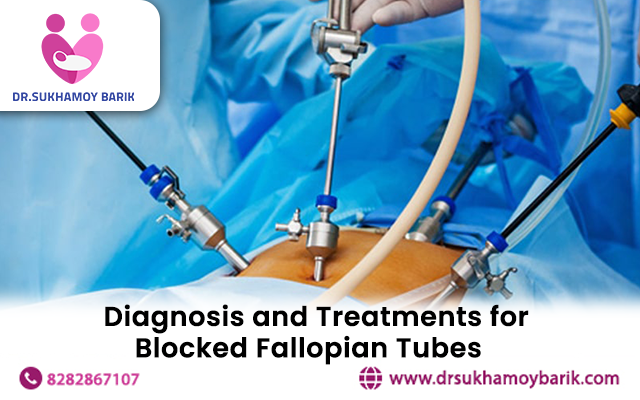Blocked fallopian tubes can present a significant challenge for women trying to conceive. Knowing the diagnosis and treatment options for the condition is crucial for those experiencing fertility issues. Below, the best gynecologist in Dum Dum has discussed on the same.
Diagnosis
Diagnosing blocked fallopian tubes involves a series of tests and evaluations by a fertility specialist or gynecologist. Here are some common diagnostic methods:
- Hysterosalpingogram (HSG): This is a specialized X-ray procedure where a dye is injected into the uterus through the cervix. The dye then flows through the fallopian tubes, enabling the doctor to observe if there are any blockages or abnormalities in their structure.
- Transvaginal Ultrasound: While primarily used to assess ovarian health and uterine abnormalities, ultrasound imaging can sometimes indicate fluid accumulation in the fallopian tubes, which may suggest a blockage.
- Laparoscopy: As per the best normal delivery doctor in Dum Dum, this involves the insertion of a small camera through a tiny incision near the navel to directly visualize the pelvic organs, including the fallopian tubes. It is considered the most accurate method to diagnose and sometimes treat blockages.
Treatments
The treatment approach for blocked fallopian tubes depends on the severity of the blockage, the location along with the underlying cause. Here are the main treatment options:
- Surgical Procedures:
- Laparoscopic Surgery: If blockages are detected during a laparoscopy, a surgeon may attempt to remove scar tissue, adhesions or other obstructions that are causing the blockage.
- Salpingectomy or Salpingostomy: If the blockage is severe or the fallopian tube is damaged, surgical removal (salpingectomy) or the creation of a new opening in the tube (salpingostomy) may be necessary but the tube is not removed in this procedure.
- Fertility Medications: In some cases, medications like antibiotics or corticosteroids might be prescribed to reduce inflammation or treat underlying infections contributing to tubal blockages, states the best gynecologist doctor in Dum Dum.
3. In Vitro Fertilization (IVF):
- IVF bypasses the fallopian tubes altogether by retrieving eggs from the ovaries directly and fertilizing them with sperm in a lab setting. The resulting embryos are then transferred in the uterus.
- IVF is often recommended when fallopian tube blockages are severe or other treatments have not been successful. It can increase the chances of conception for women with tubal issues.
Conclusion
It’s essential for individuals facing fertility challenges to seek guidance from the best gynecologist in Dum Dum who can conduct thorough evaluations and recommend the most appropriate treatment options. While tubal blockages can present significant obstacles to conception, advancements in medical technology and treatment options offer hope and opportunities for many women to achieve their dream of parenthood.
 8282867107
8282867107 sukhamoy83@gmail.com
sukhamoy83@gmail.com
